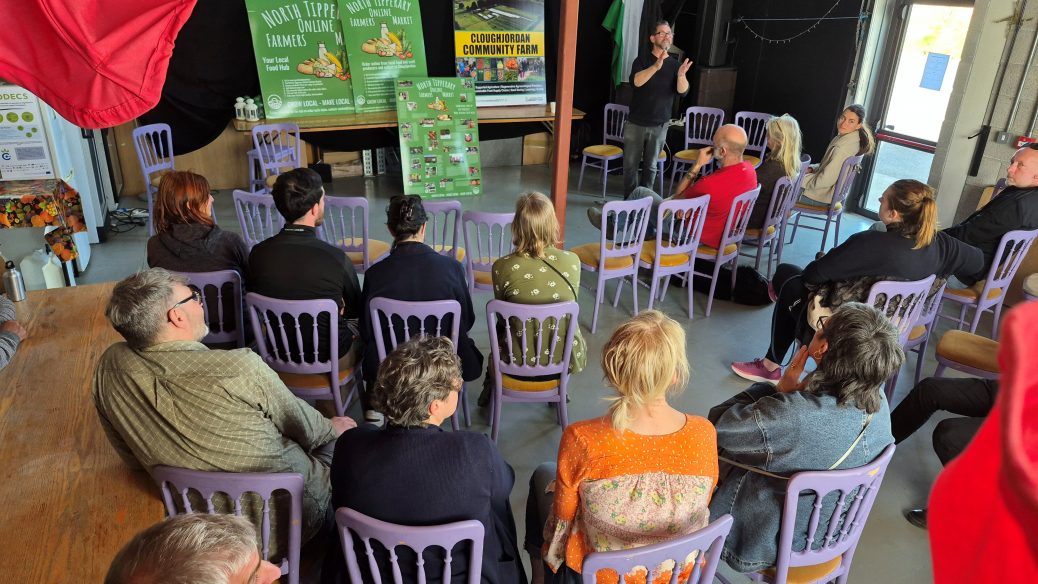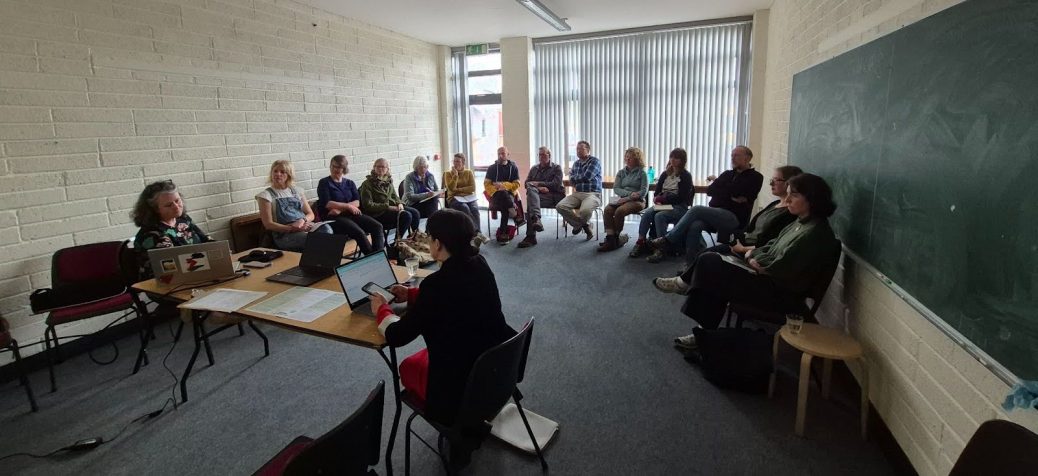Enabling short food supply chains
Led by OFN Ireland, CODECS on Friday 4th April, 1:45 – 3:00 PM – Focused on Food Hubs, digital farmers markets & the potential of local food partnerships. Oliver Moore, Evonne Boland and Ruth Hegarty tell us more.
What did we do and how did it unfold?

(CODECS workshop on the Sunday of Feeding Ourselves 2025)
A workshop was held with the Open Food Network Ireland (OFN) and the CODECS project, which focuses on living labs. OFN is a non-proprietary digital farmers market platform, while CODECS is a Horizon Europe initiative involving partners around Europe working on “sustainable digitalisation”. This means CODECS is about improving the collective capacity to understand, assess and foresee the full range of benefits and costs of farm digitalisation, and to build digital ecosystems that maximise the net benefits of digitalisation. This workshop assessed the pros, cons and potential of doing this type of market in rural Ireland.
Intro to the Open Food Network
The Open Food Network is a global network of people and organizations working together to build a new food system. Together, the network members develop open and shared resources, knowledge and software to support a better food system.
The flagship project is an open source software platform that makes it easy to create innovative, independent and values-based community food enterprises (Community Food Hubs). The platform can be used by farmers setting up their own online stores, but it is specifically designed to help farmers collaborate and sell together via local Hubs.
The platform was deployed in Ireland in late 2020 and is community owned by a non-profit cooperative since 2021. The software is free to use up to a sales threshold of €500/month, and costs 2.4% of turnover thereafter. The global team of developers ensure that the software is updated on a regular basis with these rolling out to the various country instances on a weekly basis.
The session opened with a round of introductions and those in attendance gave a small flavour of the nature of their interest in the topic of digital markets, with some having had direct experience of running a market on the OFN platform and others hearing about the tool for the first time.
Values

In order to give everyone a flavour of the OFN model and approach to its work Evonne began with an overview of the values of the organisation, many of which inform the approach taken in terms of developing functionality of the platform itself.
These values are:
- Global Commons – Everyone in the community co-creates and shares responsibility for our global commons.
- Relationships – We put great value on the interconnections between people; and between people and all other beings.
- Ecosystems – We support farmers and producers moving towards regenerative forms of agriculture.
- Transparency – We believe fundamentally in openness both in the platform we are building and the organisation that supports it.
- Empowerment – Our project creates conditions in which people empower themselves to create the food systems that work for them.
- Subsidiarity – In the context of global collaboration we believe that decisions are most effective when they are made at the most local level possible.
- Kindness – We are building a people system. Care and empathy for each other lie at its heart; celebrating respect, solidarity, diversity and inclusivity.
- Constant Emergence – We live in a perpetually evolving world, which requires constant agility, organic growth and letting go.
- Systemic Change – We believe in a global transition that addresses the root causes of current ills, not its symptoms
Platform Functionality – Map, Hubs, Product Listings & Pricing

Having considered the significance of the values to the operating model the session progressed to a demo of the shopfront functionality for both individual producers and Hubs.
The first feature of the platform app is the map of producers which includes producer profiles, shopfronts and Hubs. The challenges of maintaining a relevant map were considered – including obsolescence and the fact that the map may be over-populated with producer profiles which are not actually using the e-commerce functionality to trade, and the difficulty of distinguishing between these scenarios via the map icons.
However, the concept of mapping, knowing who is operating in the food system in a particular geographical area is also central to the ability to create connections and the network which is at the centre of a resilient local food system.

For the purpose of OFN a Hub is an online shopfront where the producer of multiple producers is aggregated and displayed to customers together in one product listing. Producers may choose to sell their produce directly, and/or via one, or indeed multiple Hubs, if that network exists. The added efficiency for producers is that they can manage harvest or production in line with demand by ensuring customers order and pay upfront. This eliminates waste at this point of the supply chain and alleviates a lot of the risk that can be involved with trading at traditional markets, where footfall can be very variable depending on weather or other outside factors.
The Hub drop-off model is also very time efficient for small producers who can’t afford to spend a lot of time away from the farm staffing a stall or delivering door to door. It makes a lot of sense to delegate those functions to a centralised Hub instead.

(The Thursday CODCES/Digital Farmers Market workshop)
Blockers
There are a number of structural and other challenges which make the process of establishing and running a successful online food market difficult, which were considered during the session:
- The Hub model requires a certain level of formal structure which ensures proper governance and mobilises the labour required to ensure the Hub tasks are covered, to guarantee the necessary security and sustainability required for the market to establish itself as a reliable route to market for small food producers. Monies are changing hands, food safety procedures must be followed and the role of the Hub manager is not insignificant in ensuring that both producers and customers are served to a high standard. That burden of responsibility is elevated when providing a paid service in your local community.
- Funding support from government to the Community sector in Ireland is overwhelmingly biased towards provision of capital funds to support the purchase of equipment whereas the lean Hub model may not in fact require the purchase of a lot of equipment. Costs are more likely to be made up of overheads such as venue rental, insurance and labour, for example.
- There’s a significant body of work to be done in some communities to source appropriate producers to supply the market on a regular basis, and to a reliable standard. There are risks to be taken and inconveniences associated with developing new routes to market and these things can take time.
- Likewise the demand side also requires investment to ensure that the customer base is sufficiently activated to support the market and choose this alternative which will likely not be as universally convenient as the large supermarket outlets. Potential customers also need to recognise the value of their custom to the resilient local food system which is being supported by the market.
Enablers
The following opportunities and potential catalysers were identified throughout the course of the discussions between attendees as they considered the reality of establishing a digital market in their own contexts.
- Opportunities to stimulate demand by partnering with other programmes such as Sláintecare (HSE) – Food Education programme in target communities – can be facilitated by the existence of a Community Food Hub which will identify natural overlaps and cross-overs in the various programmes and initiatives which may be tackling specific elements of the food system in a somewhat siloed manner. A local focus via a Hub allows for a systems approach to what is a systems problem.
- Public procurement offers a massive potential to redirect the money from the public purse towards smaller local producers which would benefit massively from a regular order from schools, hospitals, Councils etc. OFN has been involved in projects in both Wales and England to trail models of making this work and addressing the logistical barriers which can drive a mismatch between smaller local producers and large wholesale public buyers and public tenders.
- Due to their flexible and relatively mobile nature digital markets can be integrated with other community events such as sporting occasions or festivals, taking the market to the customers, as it were.
- Producer education to drive home the benefits of developing and committing to shorter supply chains of this nature, highlighting the efficiencies which can be gained by collaborating via Hubs and delegating some of the retails tasks (such as marketing & promotion, delivery etc) to the Hub organisers, and the importance of valuing that financially via a Hub admin fee, for example.
- Community Food Hubs which are run on a social enterprise basis provide a social good which should be supported, though sometimes the impact may be seen indirectly (e.g. supporting the development of micro-enterprises which may move on to trade elsewhere if they outgrow the Hub). There are also sometimes dedicated social enterprise supports which are distinct from other supports.
- Local Food Partnerships can help to bring the people who are involved in the various facets of the local food system – from production, to distribution, to emergency food provision, education, hospitality and everything in between – around the table and support the development of collaborative responses from mapping, Hub development, public procurement and beyond at a very local level.
- Partnering with large employers – where there’s a certain amount of purchasing power centralised – can offer potential to establish a variety of workplace based collection points, or delivery.
- Strategic local food economy supports – the local food economy sector is chronically underfunded. However late last year a small – too small – amount of funding was dedicated to enabling and optimising local food markets. Each project that received funding is interesting in its own right, and could serve as a valuable cog in the machinery of local provisioning. The smallest grant went to the Open Food Network, to expand the market from Cloughjordan to Nenagh – a bigger town also in north Tipperary. Early indications are that this is already benefiting both north Tipperary markets.
After this workshop, a dedicated OFN session was held on the Sunday, followed by a farm walk. Both were very well attended. There is clearly lots of goodwill behind initiatives like the Open Food Network. Moreover the way it is set up, OFN is a safer pair of hands for producers worried about reliability and also about venture capitalist skimming or other types of extractive profiteering.
This intrinsic value needs some basic supports to grow. Valuing the social good created – the work the personnel the produce – should justify providing these strategic local economy supports. A small amount can go a long way.
This article was supported by the Strengthening Local Food Economies in Ireland thematic Project via the Irish Environmental Network. Talamh Beo, Feasta and Cultivate are all involved in this project.

Join the Community of Practice!
Engage in gatherings, conversations, co-learning, webinars, and working groups to strengthen the local food movement in Ireland.

Feeding Ourselves
Pages
Sustainable Ireland Cooperative T/A Cultivate
North Tipperary Green Enterprise Park
Cloughjordan, Co. Tipperary
E53 VP 86 Ireland